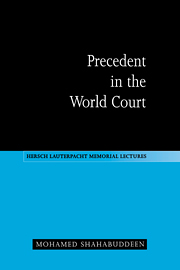Book contents
- Frontmatter
- Contents
- Foreword
- Preface
- List of abbreviations
- 1 Introduction
- 2 The growth of the Court's case law
- 3 Range of precedential resources
- 4 The bases of the system
- 5 The Advisory Committee of Jurists
- 6 The view taken by the League of Nations
- 7 The possibility of judge-made international law
- 8 Stare decisis
- 9 Distinguishing
- 10 Departing from a previous decision
- 11 Ratio decidendi and obiter dictum
- 12 Advisory opinions and decisions of chambers
- 13 The precedential impact of individual opinions
- 14 Effect and scope of the Court's case law
- 15 Conclusion
- Index
12 - Advisory opinions and decisions of chambers
Published online by Cambridge University Press: 04 May 2010
- Frontmatter
- Contents
- Foreword
- Preface
- List of abbreviations
- 1 Introduction
- 2 The growth of the Court's case law
- 3 Range of precedential resources
- 4 The bases of the system
- 5 The Advisory Committee of Jurists
- 6 The view taken by the League of Nations
- 7 The possibility of judge-made international law
- 8 Stare decisis
- 9 Distinguishing
- 10 Departing from a previous decision
- 11 Ratio decidendi and obiter dictum
- 12 Advisory opinions and decisions of chambers
- 13 The precedential impact of individual opinions
- 14 Effect and scope of the Court's case law
- 15 Conclusion
- Index
Summary
Precedential value of advisory opinions
In the case of an advisory opinion, there are no parties to be bound within the meaning of Article 59 of the Statute of the Court. An advisory opinion may operate with binding force by virtue of some mechanism outside of the Statute proper; but, even where there is no such mechanism, the practical effect of an advisory opinion in securing conformity with a particular course of conduct is considerable. The effect of an advisory opinion is not however being considered here; it is by itself a substantial area of inquiry. The aspect under review is the precedential influence of such an opinion. What is the basis of that influence?
Hersch Lauterpacht observed that Article 38, paragraph 1 (d), of the Statute ‘by referring to “decisions” might seem to exclude, inadvertently, Advisory Opinions’. So the view there was that, although an inadvertence might have led to it, ‘decisions’ (or, more fully, ‘judicial decisions’) did not include advisory opinions. In support of that view, it may be argued that the omission fell to be explained by the circumstance that the Statute, as it finally emerged, included no express provisions relating to the subject of advisory opinions, the provisions on the matter proposed by the Advisory Committee of Jurists having been suppressed by the Sub-Committee of the Third Committee of the First Assembly of the League of Nations.
- Type
- Chapter
- Information
- Precedent in the World Court , pp. 165 - 176Publisher: Cambridge University PressPrint publication year: 1996

